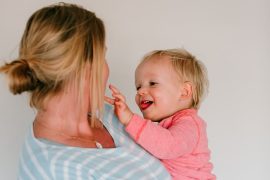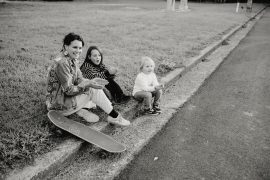9. Create Safety
When your child shows you his upsets, stay calm. Don’t take it personally. The more you stay compassionate and accepting, the more he’ll feel safe enough to show you the woundedness behind his anger. (Anger is just the body’s fight response to those threatening feelings.) Expressing those tears and fears is healing. Once he shares them with you — and he doesn’t even need to know what they’re about, or to use words — those upsetting feelings will evaporate, and he won’t need that chip on his shoulder to protect himself.
If he’s stuck in anger, create more safety by being as compassionate as you can about what’s upsetting him.
If that isn’t enough to help him cry, and he stays angry, it’s a sign that he needs more daily empathy, and more daily laughing with you. Both build trust.
10. Help your child make sense of her experience with a story
“When you were little, I was having a hard time…I yelled a lot…I didn’t know what else to do…That frightened you….So you got very very mad sometimes…Nowadays I work really hard to be kind, and not to yell….You don’t get so frightened….And you are learning better ways to show me when you are scared or mad…..We work together to solve problems in our family…..Everyone gets upset sometimes….We try to listen to each other and be kind….Then we always repair things between us….There is always more love.” All children benefit from using words and stories to understand their emotional life. Just be careful to empathise, not analyse — so she feels understood, not invaded or lectured.
11. Model apologies
Don’t force your child to apologise, because it leads to resentment. But if you model apology yourself, your child will learn to follow your example.
When something goes wrong, take as much responsibility as you can to model how to step up and take responsibility.
“I see two upset kids…I’m so sorry I wasn’t here to help you work this out before you both got so upset and started hitting…and then I got worried someone was getting hurt, so I started yelling, too…I’m so sorry….Let’s all try a do-over…..I know you don’t want to hit each other, hitting hurts…And I hear how mad you are….Let’s start over so you can tell each other what you need without attacking each other.”
Notice there is no blame or shame here, which makes it easier for everyone involved to consider how they might have contributed to the problem, and to acknowledge that.
12. Expect setbacks
You’re human, so you aren’t perfect. The secret of making this transition is having compassion for yourself, just as you do for your child. Expect to make mistakes. Expect some days to be a huge struggle. Parenting is hard, and this kind of parenting is even harder when you start. But it gets easier.
And even while it’s hard, you’re healing your child’s old wounds–and your own–so you’ll feel the difference. Quite simply, there’s less drama and more love.
13. Every morning, make the commitment
“For me, this type of parenting is a daily choice. Every morning I have to make the commitment not to yell, to stay calm, to chose love. And there is something very empowering about that. I apologise to my kids when I make mistakes and slip – I see that when they accept my apology, they feel empowerment and generosity of spirit. This influences their behaviour with each other – there are more kind words and gestures, more “I’m sorry” and more “Don’t worry, I know it wasn’t your fault” that they extend to each other, than before. There are days when things are a big struggle, but I really feel that something is changing deep within our hearts AND I feel us grow closer together when we choose love, and when in the middle of a tantrum I hug my child and genuinely tell him that I hear his pain and that I’ll help him work through it.”
You’re on a path now that leads to a happier, more peaceful family. Two steps forward, one step back still gets you where you want to go. Soon you’ll find yourself in a whole new landscape. Enjoy the journey.
Find the original article here.
Dr. Laura Markham is the founder of AhaParenting.com and author of Peaceful Parent, Happy Kids, Peaceful Parent, Happy Siblings and her latest book, the Peaceful Parent, Happy Kids Workbook.










